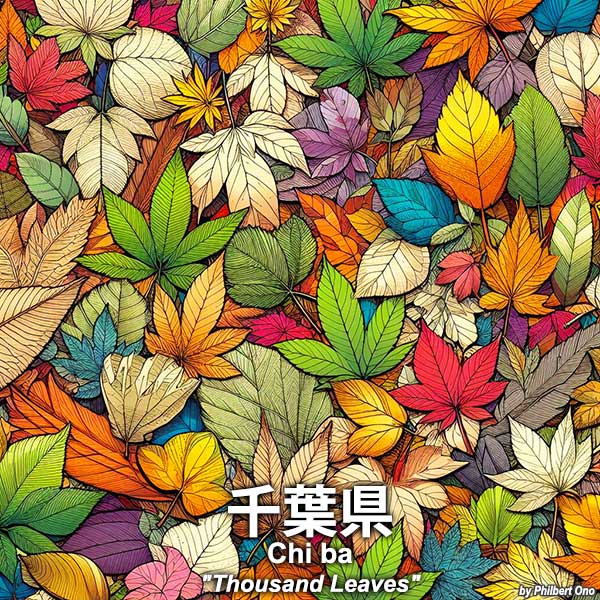CHIBA – Thousand Leaves 千葉県

As a place name, “Chiba” has been around since the 9th century. The oldest known document in which it appears is the Man’yōshū book of classical Japanese poetry from the 8th century. The exact meaning and origin remains unknown and we only have a few theories based on speculation.
Since “Chiba” implies a place with many leaves, it could mean any of the following:
- A land of abundant harvests.
- A land of lush greenery.
- A land with a lot of kudzu vine leaves (arrowroot). (Used to make starch powder and herbal medicines.)
- From the swan maiden legend related to samurai Taira Tsunemasa (平常将) who met and married a swan maiden who came down from heaven to bathe in a pond. When the emperor heard this story, he bestowed the “Chiba” family name to him. He is regarded as the ancestor of the Chiba Clan. His wife turned out to be Myoken (妙見菩薩), the clan’s divine guardian.
- The place so named in the hope for the prosperity of the land and people.
Old province names: Kazusa-no-Kuni + Shimōsa-no-Kuni + Awa-no-Kuni (上総国+下総国+安房国)
*The AI-generated image is for illustrative purposes only and may not accurately depict any particular place in the prefecture.
*Major reference sources: Official prefectural website, Japanese Wikipedia, other websites.
Origin of other prefectural names (etymologies)
Overview | Aichi | Akita | Aomori | Chiba | Ehime | Fukui | Fukuoka | Fukushima | Gifu | Gunma | Hiroshima | Hokkaido | Hyogo | Ibaraki | Ishikawa | Iwate | Kagawa | Kagoshima | Kanagawa | Kochi | Kumamoto | Kyoto | Mie | Miyagi | Miyazaki | Nagano | Nagasaki | Nara | Niigata | Oita | Okayama | Okinawa | Osaka | Saga | Saitama | Shiga | Shimane | Shizuoka | Tochigi | Tokushima | Tokyo | Tottori | Toyama | Wakayama | Yamagata | Yamaguchi | Yamanashi